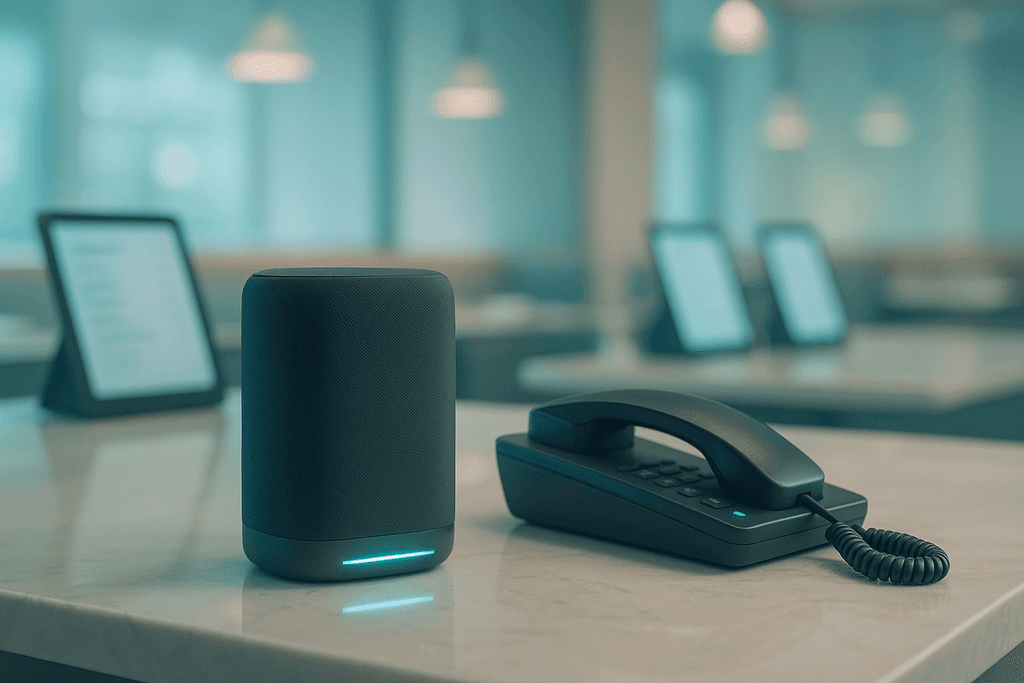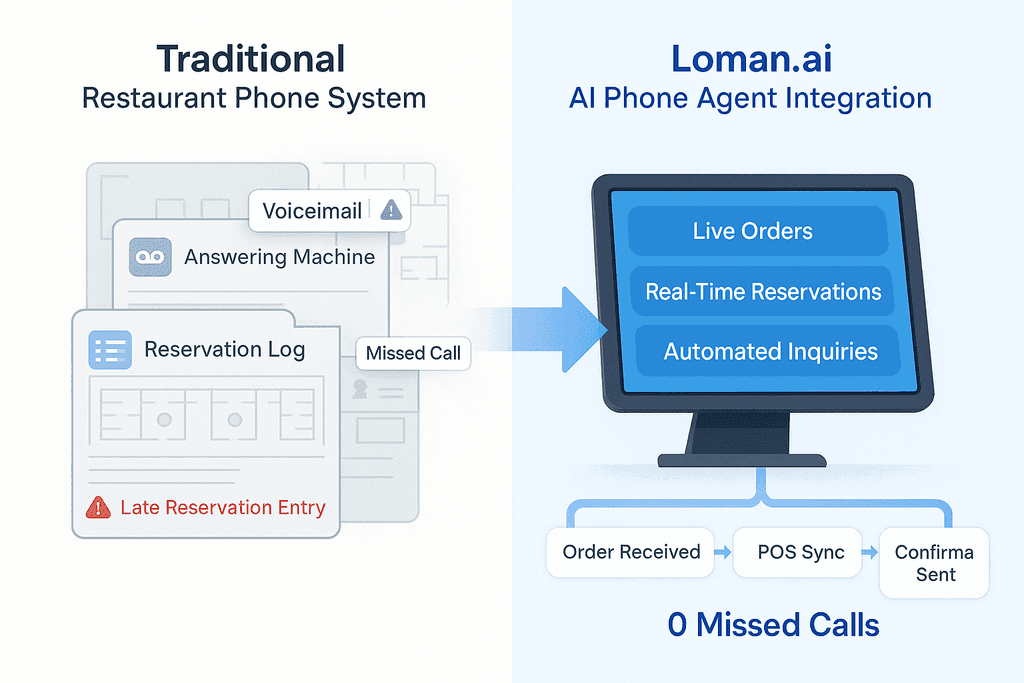August 28, 2025

Missed calls mean missed opportunities for restaurants, with studies showing up to 30% of potential orders lost due to unanswered phones. Smart AI phone assistants are revolutionizing how eateries handle customer communication, ensuring every call is answered promptly and accurately. These intelligent systems, like Loman.ai, not only boost order capture but also free up staff to focus on creating exceptional in-house dining experiences.
Remember the days when restaurant phones never stopped ringing? Staff juggled calls while serving customers, often missing orders and reservations. This chaos was the norm for decades, hurting both profits and customer satisfaction.

As technology advanced, restaurants adapted in stages:
These improvements helped, but still had limits. Missed calls meant lost business. During rush hours, even the best staff struggled to keep up.
The rise of online ordering platforms like Grubhub and DoorDash changed the game. Suddenly, customers could place orders without calling. This eased some pressure, but created new challenges:
A recent study by the National Restaurant Association found that 87% of adults use restaurant technology. This shift pushed the industry to seek smarter solutions.
Enter AI-powered phone assistants. These systems can handle multiple calls at once, take orders accurately, and even make reservations. They work 24/7, never get tired, and integrate seamlessly with existing POS systems.
For many restaurants, smart phone assistants are filling a crucial gap. They're not replacing human staff, but rather freeing them up to focus on in-person customer service. As the technology improves, we're seeing fewer missed calls, more accurate orders, and happier customers.
Smart restaurant phone assistants are changing how eateries handle calls. These AI-powered tools work around the clock, making sure no customer goes unheard. Let's look at what makes them tick.
First up, we've got 24/7 availability. No more missed calls after hours or during rush times. These assistants can handle multiple calls at once, so customers aren't left waiting.
Next, there's automated order taking. The AI connects right to the restaurant's system, so orders go straight to the kitchen. This cuts down on mistakes and speeds things up.
But what if a customer has a tricky question? That's where intelligent routing comes in. The AI knows when to pass a call to a human, making sure complex issues get sorted out fast.

Every restaurant is different, and these AI assistants get that. They can learn about specific menus, policies, and even the restaurant's style of talking to customers. This means they sound more natural and can handle detailed questions about food options or dietary needs.
For example, Loman.ai learns a restaurant's menu inside and out. It can tell customers about ingredients, suggest pairings, and even handle special requests. This level of detail helps customers feel like they're talking to someone who really knows the place.
Smart phone assistants do more than just answer calls. They can seriously boost a restaurant's efficiency. Here's how:
Let's break it down. When every call gets answered, restaurants don't miss out on potential orders. Plus, since the AI doesn't get flustered during rush hours, order accuracy goes up.
Staff productivity gets a big boost too. Instead of being tied to the phone, employees can give their full attention to customers in the restaurant. This leads to better service and a nicer dining experience overall.

Restaurant owners are always looking to cut costs without cutting corners. AI phone assistants help do just that. They reduce the need for dedicated phone staff, which can save a bundle on labor costs.
But it's not just about saving money. These systems can actually make customers happier. Quick answers, accurate orders, and easy reservations all add up to a smoother experience. And happy customers are more likely to come back and spread the word.
Numbers don't lie, and the impact of AI phone assistants on restaurants is pretty clear. Let's look at some real examples.
One pizza place saw their sales jump by 25% after they started using an AI assistant. They were catching orders they used to miss, especially during busy times. Another restaurant owner reported that the AI was actually more accurate at taking orders than their human staff.
It's not just about the numbers, though. Restaurant staff have reported feeling less stressed and more able to focus on their in-person customers. One owner said, "My staff absolutely loves the AI. They can actually take a breather during rush hour now."
Customers are noticing too. Many report shorter wait times on the phone and fewer mix-ups with their orders. This leads to better reviews and more repeat business.
Of course, every restaurant is different. Results can vary based on how busy a place is, what kind of food they serve, and how they use the AI. But the trend is clear: smart phone assistants are making a real difference in how restaurants run.
For those interested in diving deeper into the impact of AI on restaurant operations, check out this article on AI phone answering systems for restaurants. It offers more insights into how these systems are changing the game.

Smart restaurant phone assistants are changing how eateries handle customer calls. As these AI tools get better, they'll likely become a key part of running a successful restaurant.
Here's what we can expect to see in the coming years:
These advances will help restaurants serve customers better while saving time and money. But there are some challenges to think about too:
For restaurant owners, the key is finding the right balance. AI assistants like Loman.ai can handle routine tasks, freeing up staff to focus on creating great in-person experiences. This human touch is still crucial - people go to restaurants for more than just food.
As AI gets smarter, it will likely handle more complex interactions. But the goal isn't to replace humans entirely. Instead, it's about making restaurants run more smoothly so both staff and customers have a better time.
The Florida Restaurant & Lodging Association notes that AI is becoming a valuable tool in the restaurant industry. As more eateries adopt this tech, we'll likely see new and creative ways it's used to improve service and efficiency.
For now, smart phone assistants are a practical first step. They solve real problems like missed calls and order errors. As the tech evolves, restaurants that embrace these tools early on may find themselves with a real advantage.
Smart tech is changing how restaurants handle phone calls. AI phone assistants like Loman.ai are making life easier for restaurant owners and staff. They take orders, book tables, and answer questions around the clock.
These AI helpers do more than just pick up the phone. They cut down on mistakes, free up staff time, and can even boost sales. Some restaurant owners have seen their business grow by 25% after using an AI assistant.
But it's not just about making more money. It's about staying competitive in a tough industry. Restaurants that use smart tech can offer better service and keep customers happy. And happy customers tend to come back.
Thinking about trying an AI phone assistant for your restaurant? It's worth looking into. Many owners say it's a no-brainer once they see how it works. You can even schedule a demo to see how it might fit your needs.
As we wrap up, remember that tech is just a tool. The goal is still to serve great food and create great experiences. AI can help with that, but it's the human touch that makes a restaurant special. Next, let's tackle some common questions about AI in restaurants.
AI phone assistant costs vary based on features and call volume. Many providers offer tiered pricing plans starting around $100-$200 per month for small restaurants. The return on investment often outweighs the cost through increased order accuracy and captured sales.
Most AI phone assistants are designed to integrate smoothly with popular restaurant point-of-sale systems and ordering platforms. Loman.ai, for example, works with major POS systems like Square, Toast, and Clover. Always check compatibility with your specific setup before committing.
Setup time varies but typically takes a few days to a week. This includes integrating with your systems, inputting menu items, and training the AI on your restaurant's specific policies. Most of the heavy lifting is done by the provider, with minimal time required from your staff.
Many customers appreciate the quick, efficient service an AI assistant provides. Modern AI voices sound natural, and the assistants are trained to handle complex interactions smoothly. Some restaurants choose to inform callers they're speaking with an AI, while others don't. Customer feedback has generally been positive when the AI performs well.
Yes, AI phone assistants are designed to manage complex orders and special requests. They can clarify details, suggest alternatives for out-of-stock items, and even upsell when appropriate. For very unusual situations, most systems can smoothly transfer the call to a human staff member.
While AI assistants are highly accurate, no system is perfect. Most providers offer easy ways for customers to report issues and for staff to quickly correct errors. Many restaurants find that AI assistants actually reduce mistakes compared to human staff, especially during busy periods.

Enter your information in the form to receive a call from Loman and place an order like a customer would!